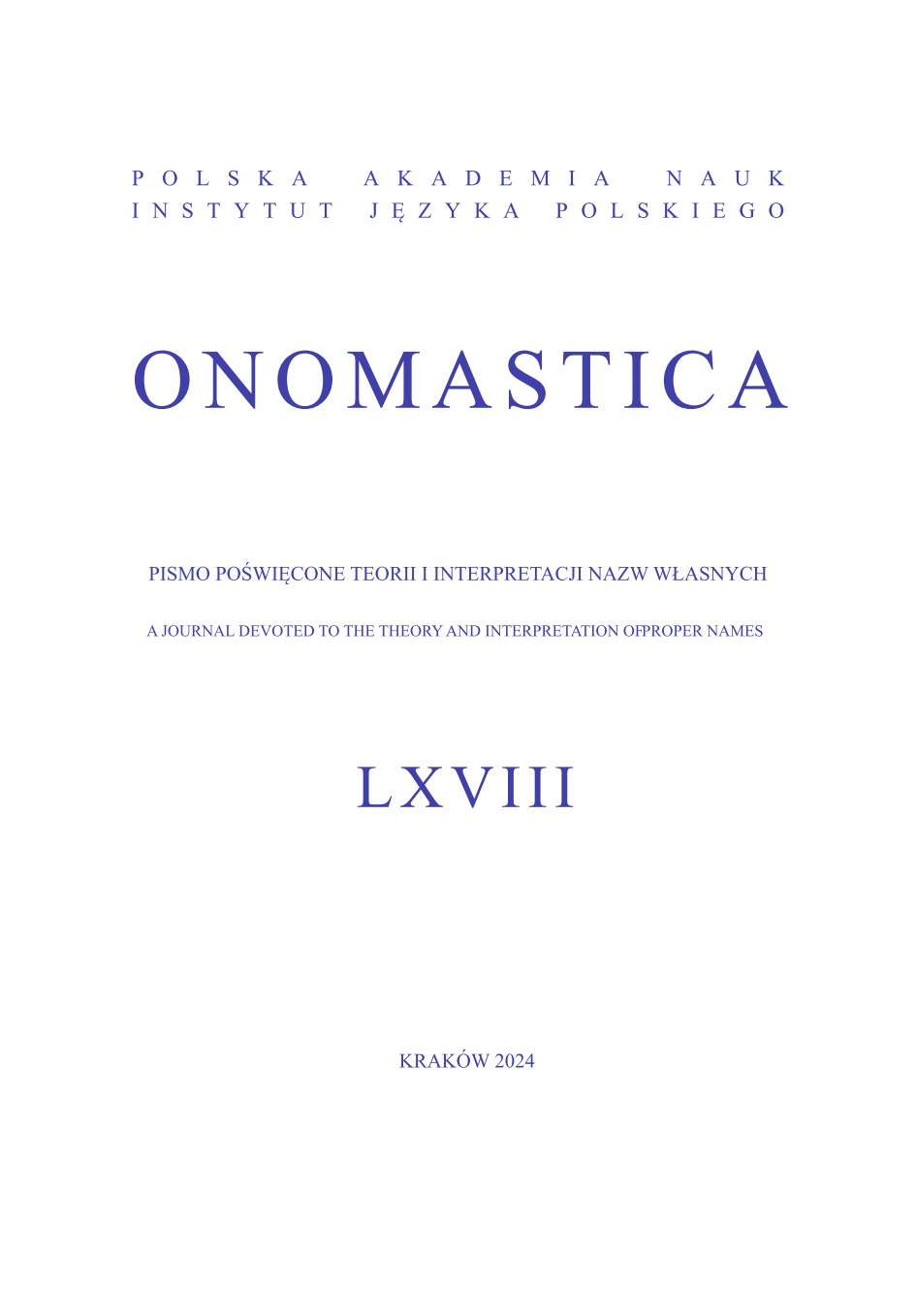Abstract
This study is devoted to the issue of the functions served by characters’ proper names in novels and their translations. The works of art chosen for analysis are Terry Pratchett’s “The Fifth Elephant” and the Polish translation of this book entitled “Piąty Elefant”. The main thesis of this article is that some characteronyms no longer serve the onymic functions in the translation which they perform in the original. Moreover, some proper names receive additional functions in the translation that they do not serve in the original. The author’s aim is to compare the functions served by characteronyms in the two books and identify which functions are preserved in the translation, which are lost, and which are added as well as to determine the reasons why some onyms lose their functions. The method chosen to conduct the research is the theory of two acts in which the functions of characteronyms are recognized and defined on the basis of the naming act and the act of using a name in the novel. Thus, they are divided into two groups of functions: permanent and momentary. The examination showed that both onymic sets serve twelve permanent and eleven momentary functions, so no function is entirely lost in the translation. Nevertheless, four permanent and four momentary functions are partly lost in the translation.
References
Ashley, L. (1987). Mudpies which endure: onomastics as a tool of literary criticism. In G. Alvarez-Altman & F. Burelbach (Eds.), Names in literature: essays from Literary onomastics studies (pp. 11–34). Lanham: University Press of America.
Biolik, M. (Ed.). (1993). Onomastyka literacka [Literary onomastics]. Olsztyn: Wydawnictwa Wyższej Szkoły Pedagogicznej w Olsztynie.
Boyadzhieva, E.B. (2017). Name Symbolism and the Bulgarian Translations of Terry Pratchett’s Discworld Characters. World Science, 8(24), Vol. 2, 16–31.
Bremer, D., & Mirto, M. (Eds.). (1999–2023). il Nome nel testo — Rivista internazionale di onomastica letteraria [the Name in the Text — International Journal of Literary Onomastics]. Edizioni ETS.
Farkas, T. (2022). Names and naming and their cultural context in Terry Pratchett’s Discworld. In O. Felecan & A. Bugheşiu (Eds.), Name and Naming: Proceedings of the Fifth International Conference on Onomastics “Name and Naming”: Multiculturalism in Onomastics (pp. 965– 972). Cluj-Napoca: Editura Mega. https://doi.org/10.30816/ICONN5/2019/75
Felecan, O. (Ed.). (2018). Onoma 53. Journal of the International Council of Onomastic Sciences. https://doi.org/10.34158/ONOMA.53/2018
Gerus-Tarnawecky, I. (1968). Literary Onomastics. Names, 16(4), 312–324. https://doi.org/10.1179/ nam.1968.16.4.312
Gibka, M.K. (2016). The Momentary Sociological, Camouflaging, Conative and Poetic Functions of Characters’ Proper Names in the Polish Translation of “Harry Potter”. In E. Kujawska-Lis &
I. A. NDiaye (Eds.), Komunikacja międzykulturowa w świetle współczesnej translatologii. Tom 6: Teoretyczne i praktyczne aspekty przekładu literackiego (pp. 93–107). Olsztyn: Uniwersytet Warmińsko-Mazurski w Olsztynie.
Gibka, M.K. (2018a). Functions of characters’ proper names in novels. Onoma, 53, 49-66. https:// doi.org/10.34158/ONOMA.53/2018/4
Gibka, M.K. (2018b). The functions of characters’ proper names in Men at Arms by Terry Pratchett. Acta onomastica, 59, 54–68. https://asjournals.lib.cas.cz/actaonomastica/article/uuid:96d9e229-18eb-4af6-993a-800e8fa80923
Gibka, M.K. (2019). Literary Onomastics: A Theory. Łódź: ArchaeGraph.
Gibka, M.K. (2020). The Functions of Characters’ Proper Names in Feet of Clay by Terry Pratchett. In L. Balode & K. Čīšangs (Eds.), Onomastic Investigations II (pp. 81–94). Riga: Latvian Language Institute, University of Latvia. Journal of Literary Onomastics. (2011–2019). The College at Brockport: State University of New York.
Kęsikowa, U. (1988). Funkcja dydaktyczna nazewnictwa w powieściach dla młodzieży [The didactic fuction of proper names in young adult novels]. In E. Homa (Ed.), Onomastyka w dydaktyce szkolnej i społecznej. Materiały z VI Konferencji Onomastycznej (pp. 81–86). Szczecin: Wydawnictwo Naukowe Uniwersytetu Szczecińskiego.
Kohlheim, V., & Kohlheim, R. (2019). Der Name in der Literatur [The name in literature]. Heidelberg: Universitätsverlag Winter.
Kuffner-Obrzut, K. (2003). Nazwy osobowe w wybranych utworach Małgorzaty Musierowicz [Proper names in chosen works by Małgorzata Musierowicz]. In M. Biolik (Ed.), Metodologia badań onomastycznych (pp. 485–498). Olsztyn: Ośrodek Badań Naukowych im. Wojciecha Kętrzyńskiego.
Manova-Georgieva, Y. (2020). What’s Behind a Name? Origins and Meaning of Some of the Recurrent Characters in Terry Pratchett’s Discworld. ELOPE: English Language Overseas Perspectives and Enquiries, 17(2), 165-176. https://10.4312/elope.17.2.165-176
Pratchett, T. (1999). The Fifth Elephant. London: Corgi Books.
Pratchett, T. (2013). Piąty Elefant [The Fifth Elephant] (P. Cholewa, Trans.). Warszawa: Prószyński i S-ka. (Original work published 1999)
Rudnyckyj, J. B. (1959). Functions of Proper Names in Literary Work. In P. Böckmann (Ed.), Stilund Formprobleme in der literatur (pp. 378–383). Heidelberg: Carl Winter.
Rutkowski, M. (2001). Mikrotoponimia przestrzeni wspinaczkowej. Studium socjoonomastyczne [Microtoponymy of climbing space. A socioonomastic study]. Olsztyn: Wydawnictwo Uniwersytetu Warmińsko-Mazurskiego.
Smith, G. W. (2021). Names as Metaphors in Shakespeare’s Comedies. Wilmington: Vernon Press.
Smith, G., & Debus, F. (Eds.). (2005). Onoma 40. Journal of the International Council of Onomastic Sciences. https://doi.org/10.2143/ONO.40.0.2033067
Wilkoń, A. (1970). Nazewnictwo w utworach Stefana Żeromskiego [Names in works by Stefan Żeromski]. Wrocław: Zakład Narodowy im. Ossolińskich.
Windt, B. (2005). An overview of literary onomastics in the context of literary theory. Onoma, 40, 43–63.
Windt-Val, B. (2012). Personal names and identity in literary contexts. Oslo Studies in Language, 4(2), 273–284.


